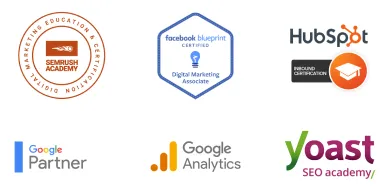TO LEARN IS TO GROW
Learning Center
We do our research and publish our results. Should probably call this the Growing Center.


What Do I Need To Know About SEO? (9 Things You Should Know as a Business Owner)
Look, we get it. It’s hard enough that you’re running a business and now you gotta worry about getting into digital marketing too
Marketing is an important part of any business operation. It keeps you top-of-mind among your clients so that when it’s time for them to buy your products and services, your brand will right up there well over your other competitors.
And now that your potential customers are all online, this is where search engine optimization, or SEO, comes into play.
What exactly do we mean by this?
Search engine optimization allows your website to be found by people who are just about ready to buy what you’re offering.
At a time when people turn to online search when they’re looking for a very specific answer to a particular question, a solution to a problem, or immediate relief for their pains, SEO allows your brand to be discovered by people who need you the most.
That said, here are a few things you, as an owner of a small business, should know about search engine optimization:
SEO brings you new leads for years.
For any brand or business, SEO is still the best way to achieve long-term (and sustainable) gains in online traffic and visibility.
It takes a website quite a while to rank. If your SEO work is spot on, you might actually be one of the 5% of sites to crack into the top 10 of the Google search engine results page anywhere within two to six months.
The ones at the top spots have been around for at least a couple of years (maybe more) and have somehow stayed relevant ever since.
What this means is: you have to get cracking now. Knowing that a lot of sites have no idea how to bring in traffic means you now have an edge with a solid foundation of SEO and implementing your strategies throughout your marketing campaign.
SEO is (relatively) easy to understand, but it’s a LOT of work.
Can anyone just go ahead and learn SEO? Yes. And in fact, a lot of business owners probably do know the basics of search engine optimization.
What sort of work is expected when you do SEO?
A lot of research. Specifically, choosing the right topics (i.e. keywords or key phrases), and knowing how competitive these topics are. You’ll also be researching a lot on what you should be writing about and how your competition is doing.
A lot of writing. You’ll be showcasing your expertise and knowledge on your chosen subject matter with a lot of helpful, original content your target market would find timely and relevant.
A bit of website management. Sort of like tinkering under the hood of your website. You need to learn how to do tweaks and adjustments to make your site more search-engine-friendly.
A lot of analyzing. The good thing is, SEO is measurable. Through the use of SEO tools and other services, you can see what worked, what didn’t, and what sort of data you can get from how your visitors have interacted with your site.
A lot of other menial tasks. Like tagging, keeping track of character counts, entering links and figures onto a spreadsheet– you know, all that “fun” stuff.
A lot of relationship building. Particularly true during your link-building efforts, especially if you’re going out there actively promoting your content.
SEO is all about ranking
The objective of any good search engine optimization campaign is to get your site, or your content, to rank with a specific topic, keyword or key phrase.
How do we know your site is achieving the rankings we want? Do a Google search and see where you place on the search engine results page (SERP). The closer you are to the very first page, and the very top spot, the better your ranking.
Ever noticed how when you’re looking for something online, you usually end your search by clicking on a result right there on the first page?
That’s pretty much how everyone online does it. In fact, 75% of people don’t even scroll past the first page of a Google search. Which is why that top spot on Page 1 comes highly coveted for brands and businesses.
Better ranking can bring more traffic, and more traffic can bring in more business for you!
Ranking can change over time, whether due to your own efforts, your competition’s, or even the implemented updates to Google’s search algorithm every so often.
SEO professionals keep track of ranking using a variety of tools, and employ a variety of tactics to maintain generally good rankings for the topics and keywords they’ve identified.
Nobody knows how Google’s search engine REALLY works
The secret sauce behind Google’s search algorithm has been the subject of debate and discussion for many internet marketers.
Other than a few cryptic clues dropped by a top-level Google exec every now and then, much of what the community really knows about SEO is the result of experimentation, trial-and-error, and educated guesses.
So as far as SEO is concerned, do we know what we’re doing? For the most part, yes we probably do.
Can we be assured of a top spot on search rankings? We can do the best we can, but there are simply no assurances.
Google’s search engine is a LOT more sophisticated now.
There’s a reason why Google continues to be so huge today when other search engines have completely fallen off the radar over the last couple of decades.
(When was the last time you used Alta Vista to search for something online? Lycos? AskJeeves? Exactly.)
Understand that the main purpose for Google’s search engine is to give any user entering any query at any given time the best possible search engine results it can find online. And all the most recent algorithm adjustments have all been about giving Google users better and better search results.
One of the most important add-ons they’ve built into the search engine is an A.I.-powered component called Rankbrain. Simply put, by accessing years of historical search data, Rankbrain is able to discern search intent. Which means no matter how you phrase a certain search query…
“How do I make a great cup of cappuccino coffee?”
“Cappuccino coffee making tips”
“Creating the best cappuccino at home”
Google now knows that all these mean just one thing, and will most likely serve the same search results for these queries, as well as other queries just like it.
SEO is done differently now (in 2019).
As a result of Google’s more sophisticated search algorithms, the game has changed much for search engine optimization practitioners, especially so these last couple of years.
It used to be that some digital marketers would try to outsmart Google to improve their rankings. Commonly employed methods would include keyword stuffing, link farms and link pyramids, superfluous content, low-quality websites, and others.
You can say Google sees through all these shady practices now. Keep in mind that it has years of historical data, and an artificial intelligence-powered component to better perform its task of determining search intent and delivering the best results to users.
In fact, Google has over 200 ranking factors to determine what makes a particular page or article rank better than another.
Exactly how much weight does each factor have on individual rankings– we can only make an educated guess at best. And again, Google can change its formula or tweak its algorithms anytime it feels it should.
The rules of SEO are ever-changing, and a successful SEO practitioner always makes the effort to stay abreast of the latest developments in all things related to inbound marketing, search engines, and creating killer content.
Content is (still) king
Speaking of killer content, SEO today has also changed the way we should be creating our posts and articles.
There are millions of blog posts out there; even in your own space, you’ll find dozens, if not hundreds of articles on the topic of your choice.
To differentiate really awesome content from everybody else’s, yours has to be:
Genuinely helpful. Are you answering the questions asked by your target audience?
Original. At least come up with a slightly different spin on an old topic; offer a new point of view, or make it more relevant for your target audience somehow.
Focused on your chosen topic, keyword, or keyphrase. You likely have quite a lot to share, but there’s no need to go off-tangent. Stick to one topic, or answering one question (or set of related questions) in one article.
Well-researched. In fact, you probably have links to a few other authoritative sources within your article to back up your claims.
Broken up with subheadings, paragraphs, and maybe even some bullet points to make the text easier to read, even if the article is packed with information.
Sprinkled with photos, graphics and charts, even videos, or other media to help drive your point home.
Devoid of superfluous filler text. Get right to the meat and potatoes of it. State the problem, question, or issue. Address it with an answer. Support your answer or go further in depth. Then close with a summary or conclusion of sorts.
Using your identified keyword consistently throughout your piece. No need to force it. Just make sure it’s in your title, URL, meta description, alt tags of your photos, and somehow used naturally throughout your article.
The growing importance of User Experience (UX)
Probably of greater importance these last few years is the concept of User Experience, or UX.
Let’s put it this way: you could write the absolute best ever article on how to make the perfect cup of cappuccino, but if your website’s overall user experience is lousy, you’re not going to do so well on the rankings as you should.
Remember, Google wants only the very best search results to show up on SERPs. This means we’re looking at websites that are, at the very least…
Responsive. Which means your site looks great on a mobile phone. It’s easy to read, easy to navigate, and
Fast-loading: Because nobody loves a site that loads oh-so-slowly! Make sure your site isn’t bogged down by way too many unnecessary plugins or media files.
Secure. Especially if your site is going to be asking for personal information (like names and email addresses) or payment info. A secure site is a more trustworthy site, and that’s what you’d want to go for.
Well-designed. You’ll want a design that not only represents your brand well, but also has a clean layout that’s easy on the eyes. Big enough fonts, an easy way to find information on any given page, and esthetically pleasant overall.
Made with real content. Not auto-generated content, straight-up copied content, or content created out of a template or RSS feed.
Not riddled with ads and pop-ups. People don’t mind ads, just not too much of them. While we’re at it, if you do have affiliate links or sponsored posts, it’s better for you to be upfront about it. Your market might even be more supportive than you give them credit for.
Have a well-written headline and meta description. Without sensationalizing your headline, there is always a creative way to go about getting a potential visitor to pick your site out of a list of Google search results.
Google knows if someone leaves your site after skimming it for just a second or two, or if your visitor has taken the time to really go through your article, and go looking for similar pages in your site.
SEO is part of inbound marketing.
As part of the inbound way of doing marketing, search engine optimization works best when used in tandem with other digital marketing methods like social media, content marketing, online advertising, video, and others.
SEO plays a major role in the buyer’s journey, particularly when they start researching about your products and services– items you sell that solve a very specific problem, need, or want.
SEO alone won’t close you sales, however, which is why you must have an entire mechanism to successfully guide a lead and nurture it towards conversion (i.e. a sale).
Think of SEO as an important part of your overall marketing mix. SEO can be of tremendous value to your marketing efforts, but works even better when supported by other inbound marketing tactics, as well as conversion optimization methods.
Conclusion
As a business owner, all you need to know about search engine optimization (or SEO) is this:
It’s a great way to build long-term, organic, sustainable traffic to your site.
It’s mostly about creating helpful, timely, and relevant content your target market is going to appreciate.
The old rules of SEO don’t apply anymore today, as Google’s search algorithms have grown much more sophisticated.
Just how deep into the SEO rabbit hole you plan to dive into is entirely up to you.
A lot of what needs to be done with SEO can be outsourced, or you can sign up for certain digital marketing or blog management services to help you get your site up-to-date according to 2019 best practices.
Regardless of how hands-on you’d like to be with your own inbound marketing efforts, having a good understanding of what is entailed in a proper SEO strategy allows you to make better, more well-informed business decisions about your overall brand marketing efforts.
Growing Businesses Since 2008
We have helped hundreds of businesses just like yours. Working for or along-side of business owner, managers, staff, or even board of directors, LOJO is ready to be an asset to your business.
Our team has been curated through the years for individual skills, personalities, and capabilities. Our clients put their trust in us to help them grow. We are here to do just that.



Growing Businesses Since 2008
We have helped hundreds of businesses just like yours. Working for or along-side of business owner, managers, staff, or even board of directors, LOJO is ready to be an asset to your business.
Our team has been curated through the years for individual skills, personalities, and capabilities. Our clients put their trust in us to help them grow. We are here to do just that.




Matthew Rogers, President
iProspect Check
After spending several months reviewing multiple proposals from several different companies we engaged LOJO to develop a new website that represents our company effectively. We worked initially with Stephen Platte who helped create the scope of the project. Stephen was knowledgeable and always followed up with me on time and as promised.
He "closed the deal" for LOJO with his professionalism, service orientation and easy going approach. Once we signed the contract we were introduced to Jay Kelly who would be the creative lead for LOJO. This was the most challenging part of the project for my company, as there was no shortage of ideas from our side. Jay managed the project flawlessly, and once we had all agreed to the design, Jay introduced us to Eric.
Eric Lay is one of the founders of LOJO. Eric took the design we had developed and brought it to life. We delivered content as quickly as he requested it. Eric kept the project on task and we responded by exceeding every deadline for content. In turn, once provided, literally not a day went by that Eric didn't add the content and take the next step. In just a few weeks we launched our new website. Eric is a pleasure to work with.
His positive attitude and consultative approach really enhanced the experience and made a big difference for us in the outcome of our project. We would welcome you to visit our website to take a look at the quality work of LOJO. We are very pleased with LOJO and look forward to working with them in the future as we pursue an aggressive SEO strategy."
After spending several months reviewing multiple proposals from several different companies we engaged LOJO to develop a new website that represents our company effectively. We worked initially with Stephen Platte who helped create the scope of the project. Stephen was knowledgeable and always followed up with me on time and as promised.
He "closed the deal" for LOJO with his professionalism, service orientation and easy going approach. Once we signed the contract we were introduced to Jay Kelly who would be the creative lead for LOJO. This was the most challenging part of the project for my company, as there was no shortage of ideas from our side. Jay managed the project flawlessly, and once we had all agreed to the design, Jay introduced us to Eric.
Eric Lay is one of the founders of LOJO. Eric took the design we had developed and brought it to life. We delivered content as quickly as he requested it. Eric kept the project on task and we responded by exceeding every deadline for content. In turn, once provided, literally not a day went by that Eric didn't add the content and take the next step. In just a few weeks we launched our new website. Eric is a pleasure to work with.
His positive attitude and consultative approach really enhanced the experience and made a big difference for us in the outcome of our project. We would welcome you to visit our website to take a look at the quality work of LOJO. We are very pleased with LOJO and look forward to working with them in the future as we pursue an aggressive SEO strategy."

Matthew Rogers, President
iProspect Check
The team at LOJO were wonderful to work with. They are well organized and very patient as we worked through our marketing strategy and developed a well thought out and clear action plan at a reasonable price. We will definitely be back for our future campaign needs."

Jon Crosby, Founder
Dazil

